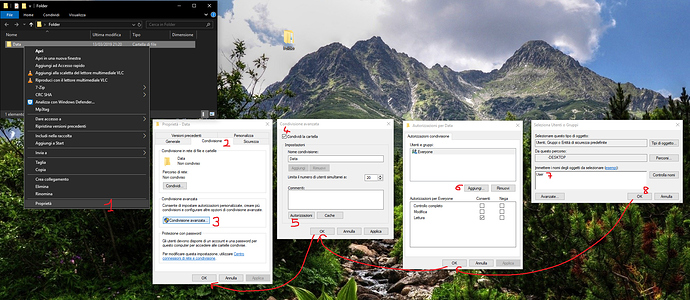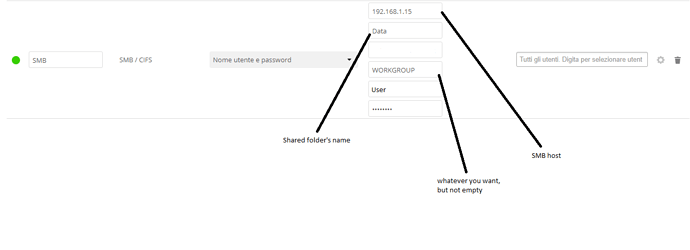Hello Everyone! I"m new to the Linux Homelab Environment. It’s been one heck of a learning curve for me, but things have come along. I’m needing help with setting up My own (local) SMB External Share.
No matter what i do, i get a red Dot and OC will not connect to it. I have a feeling i’m missing something simple here.. It’s been that way the whole way but, I cannot find the exact answer i’m looking for in the manual, online, how to’s, etc.
If my Samba Server and Share(s) are located on the same server as OC, what do i put for the URL?
I would understand an IP address if it’s a remote/OFF server share but, if they’re (OC and Samba server) both on the same server?
I have a raid 10 mounted to a Folder, which is then shared to my home network with Samba for Windows machines to connect. I want to connect this specific share to OC so i can reach it when away from home.
Sambe Share “Pictures”
Raid 10 mount: /Raid-Array Folder
Will update config files once i get home. I apologize if i lack enough information at this exact time. Thanks in advance for any/everyone’s help!
C-los
→
Steps to reproduce
- Login as OC Login through Web Portal
2.During Setup of External SMB Storage
Expected behaviour
Connect same Server SMB Share to Owncloud for Remote access.
(i.e., My ubuntu server (Dell R710) has OS, Samba Server and OC (including LAMP structure) All in the same place/server)
Actual behaviour
Always get a red dot for connection to Share.
Server configuration
Ubuntu 18.04.01 LS
Web server:
Apache
Database:
MySQL
PHP version:
7.2 (Comes with Ubuntu 18.04.01 LTS)
ownCloud version: (see ownCloud admin page)
Latest 10.0.10
Updated from an older ownCloud or fresh install:
Fresh Install using these instructions/guides
Where did you install ownCloud from:
APT-Get packages per above guide
Will update below when i get home<<<
Signing status (ownCloud 9.0 and above):
Self Signed Certificate per guide above
Login as admin user into your ownCloud and access
http://example.com/index.php/settings/integrity/failed
paste the results into https://gist.github.com/ and puth the link here.
The content of config/config.php:
{
"basic": {
"license key": "***REMOVED SENSITIVE VALUE***",
"date": "Fri, 28 Dec 2018 04:04:04 +0000",
"ownCloud version": "10.0.10.4",
"ownCloud version string": "10.0.10",
"ownCloud edition": "Community",
"server OS": "Linux",
"server OS version": "Linux titan 4.15.0-43-generic #46-Ubuntu SMP Thu Dec 6 14:45:28 UTC 2018 x86_64",
"server SAPI": "apache2handler",
"webserver version": "Apache\/2.4.29 (Ubuntu)",
"hostname": "10.0.10.10",
"logged-in user": "anonymous"
},
"stats": {
"users": {
"Database": {
"count": 4,
"seen": 3,
"logged in (30 days)": 3
}
},
"groups": {
"OC\\Group\\Database": 2
}
},
"config": {
"updatechecker": false,
"instanceid": "ocrbxowcl8l9",
"passwordsalt": "***REMOVED SENSITIVE VALUE***",
"secret": "***REMOVED SENSITIVE VALUE***",
"trusted_domains": [
"10.0.10.10"
],
"datadirectory": "\/var\/www\/owncloud\/data",
"overwrite.cli.url": "https:\/\/10.0.10.10",
"dbtype": "mysql",
"version": "10.0.10.4",
"dbname": "owncloud",
"dbhost": "localhost",
"dbtableprefix": "oc_",
"mysql.utf8mb4": true,
"dbuser": "***REMOVED SENSITIVE VALUE***",
"dbpassword": "***REMOVED SENSITIVE VALUE***",
"logtimezone": "UTC",
"installed": true,
"mail_domain": "***REMOVED SENSITIVE VALUE***",
"mail_from_address": "***REMOVED SENSITIVE VALUE***",
"mail_smtpmode": "smtp",
"mail_smtpsecure": "ssl",
"mail_smtpauthtype": "PLAIN",
"mail_smtpauth": 1,
"mail_smtphost": "***REMOVED SENSITIVE VALUE***",
"mail_smtpname": "***REMOVED SENSITIVE VALUE***",
"mail_smtppassword": "***REMOVED SENSITIVE VALUE***",
"files_external_allow_create_new_local": "true"
},
"integritychecker": {
"passing": true,
"enabled": true,
"result": []
},
"core": {
"allow_user_mount_sharing": "yes",
"enable_external_storage": "yes",
"first_install_version": "10.0.10.4",
"installedat": "1545562952.922",
"lastcron": "1545969838",
"lastupdateResult": "[]",
"lastupdatedat": "1545969807",
"public_files": "files_sharing\/public.php",
"public_webdav": "dav\/appinfo\/v1\/publicwebdav.php",
"shareapi_allow_social_share": "no"
},
"apps": [
{
List of activated apps:
External Storage
If you have access to your command line run e.g.:
sudo -u www-data php occ app:list
from within your ownCloud installation folder.
Are you using external storage, if yes which one: local/smb/sftp/…
Yes Local/Same Server Samba Storage
Are you using encryption: yes/no
Are you using an external user-backend, if yes which one: LDAP/ActiveDirectory/Webdav/…
With access to your command line run e.g.:
sudo -u www-data php occ ldap:show-config
from within your ownCloud installation folder
Without access to your command line download the data/owncloud.db to your local
computer or access your SQL server remotely and run the select query:
SELECT * FROM `oc_appconfig` WHERE `appid` = 'user_ldap';
Eventually replace sensitive data as the name/IP-address of your LDAP server or groups.
Client configuration
Browser
Chrome
Operating system:
Windows 10

 Cheers and thanks in advance!
Cheers and thanks in advance!
